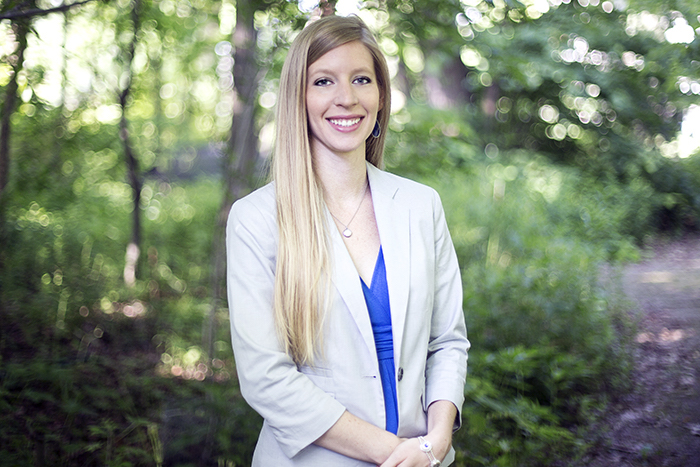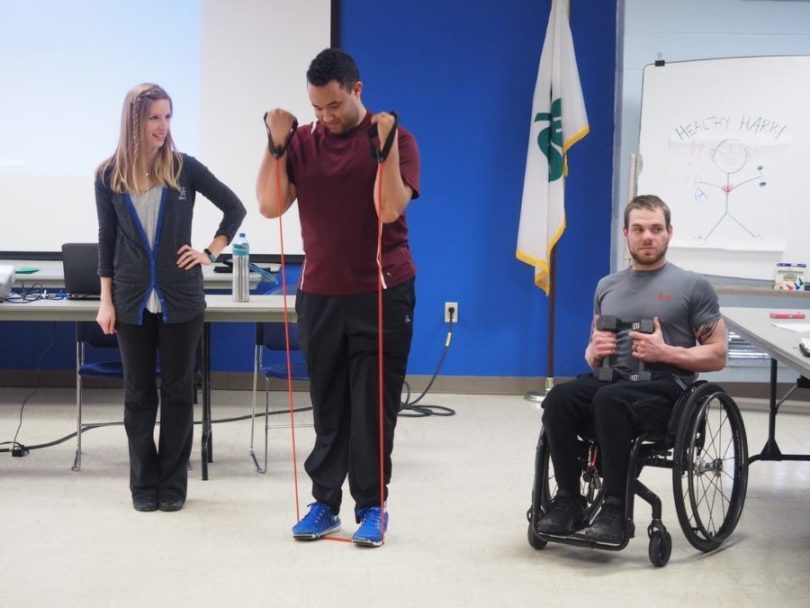
Even as a young girl, Lindsey Powell Mullis ’06 was drawn to people who might be overlooked by others. When she saw a little girl step off of a special education bus, she walked down the street, knocked on the door and asked if she could play. That desire to be part of the life of someone with a disability continued as she grew up, and still guides her personal and professional life.
Mullis is the program director for the Kentucky Inclusive Health Collaborative at the University of Kentucky’s Human Development Institute (HDI), and is the adoptive mother of a young girl from China with Down syndrome.
“A lot of people get into this field because of someone in their life with a disability that motivates or inspires them to want to change the world for that person,” Mullis reflects. “I didn’t grow up around anyone with disabilities — I was just wired this way. And it’s the way that I was raised.”
The Inclusive Health Collaborative that Mullis runs promotes equitable health for people with disabilities through several projects as part of HDI’s full scope of over 50 projects that support people with disabilities across the lifespan. That would be challenging enough, but the team is funded entirely through grants. So, before the work can begin to address health disparities, the case must be made for funding.
“The greatest challenge is that disability is the most overlooked minority group,” says Mullis, noting that one in three people in Kentucky lives with a disability. Educating people to comprehend the scale of the challenge often brings about an “aha moment” in conversation, she says, and helps to build connection. The ultimate goal is to make health and wellness inclusive of the entire population, and to help everyone see that disability rights are human rights.

“Health is such a broad foundation across all the aspects of our lives, whether it be social relationships, employment or the values that we have,” Mullis says. “That’s a big part of why we have the advocacy component. We wouldn’t be successful if we didn’t have it.”
Working to reduce the health disparities for people of all ages, Mullis has become an expert in connecting people to resources and opportunities, building partnerships, emphasizing inclusivity in the collection of data and always encouraging participation and leadership from people with disabilities. The quality of her work has been recognized by the American Public Health Association, which gave her the Disability Section Student Member Award in 2019 and the next year elected her co-chair of planning the disability section program for APHA over the next three years.
As she discusses each new development in her career, references to Transylvania return as a sort of refrain — from the holistic approach to her field and the academic rigor that has made her postgraduate scholarship successful (even after lengthy breaks from academia) to the supportive community and hands-on experience. Mullis is now pursuing a Ph.D. at the University of Kentucky.
“Transy is where you can actually start putting your passion into the work that you do,” Mullis says. “That’s where I really got to gain more experience in disability.”
At Transy, Mullis made the important connection between mind and body in health when she took former basketball coach Don Lane’s Introduction to Exercise Science class. “I came in just thinking about the psychology aspect, that being my chosen major,” she explains. “But as I learned more about exercise science and a holistic view of health and wellness, that’s what really drew me to wanting to have a broader understanding of health and wellness.” She added exercise science as a second major and focused all of her papers and practicum experience on disability. The combination of the two majors and her specific focus proved to be fruitful.
“There’s so much overlap of the mind and the body,” she says, noting the interaction of the social sciences and how perfectly they integrate with the world of disability. The clincher, she always likes to tell undergraduates, was jumping in and gaining hands-on experience through internships and volunteering.
She remembers how responding to a flyer on the Transy psychology department bulletin board led to a challenging summer camp internship in a remote area of New York. As a bunk counselor she worked with preteen boys who were wards of the state or dealing with juvenile delinquent issues. But part of camp was for kids with disabilities.
“They tried to do inclusion within that program,” she recalls, “with everyone getting the same experiences at camp. That was one of my first real challenges and experiences supporting individuals within the disability community. It changed my life, because it taught me so much.”
She likes to encourage students to put themselves out there and discover if the work is right for them. “It was my practicum opportunity and those volunteer experiences that really helped me get that idea of where my interests and passions were,” she says, “and my capacity for doing good and making change in the world.”

Mullis keeps in touch with her alma mater, visiting campus and talking with students (online during COVID-19). She recently offered a virtual internship to a senior who is a disability advocate. Read about Nathan French ’21.
“The community at Transy is very special,” she notes. “It’s easy to stay connected. And when you have a need, people from across the Transy community always seem to want to help each other.” Whether giving or receiving as a member of that community, Mullis is living the lasting results.
“I loved my experience at Transy,” she says. “I really feel like my time at Transy helped me become who I am and who I want to be.”

